英语单词语法和重点句型
二年级英语单词和重点句型
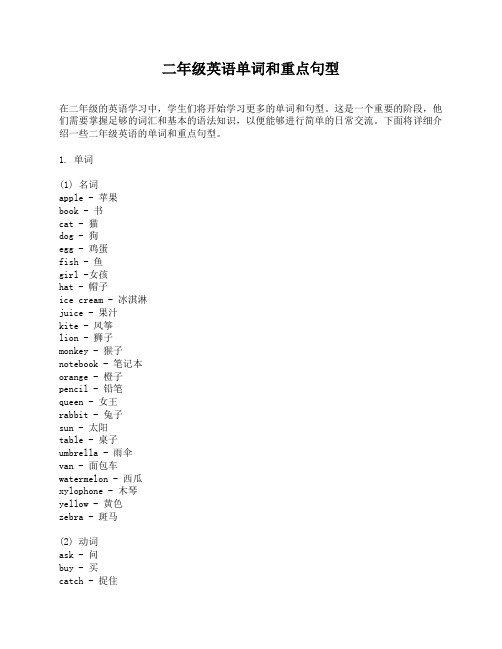
二年级英语单词和重点句型在二年级的英语学习中,学生们将开始学习更多的单词和句型。
这是一个重要的阶段,他们需要掌握足够的词汇和基本的语法知识,以便能够进行简单的日常交流。
下面将详细介绍一些二年级英语的单词和重点句型。
1. 单词(1) 名词apple - 苹果book - 书cat - 猫dog - 狗egg - 鸡蛋fish - 鱼girl -女孩hat - 帽子ice cream - 冰淇淋juice - 果汁kite - 风筝lion - 狮子monkey - 猴子notebook - 笔记本orange - 橙子pencil - 铅笔queen - 女王rabbit - 兔子sun - 太阳table - 桌子umbrella - 雨伞van - 面包车watermelon - 西瓜xylophone - 木琴yellow - 黄色zebra - 斑马(2) 动词ask - 问buy - 买catch - 捉住dance - 跳舞eat - 吃fly - 飞give - 给have - 有jump - 跳跃kick - 踢laugh - 笑make - 制作nurse - 护士open - 打开paint - 画run - 跑sing - 唱歌take - 拿understand - 理解visit - 参观walk - 走yell - 喊叫zip - 拉上拉链(3) 形容词big - 大的cold - 冷的fast - 快的happy - 快乐的long - 长的nice - 好的old - 老的quick - 快速的small - 小的tall - 高的young - 年轻的2. 句型(1) 问候语Hello! - 你好!Good morning! - 早上好!Good afternoon! - 下午好!Good evening! - 晚上好!How are you? - 你好吗?I'm fine, thank you. - 我很好,谢谢。
九年级全册重点单词短语和句型及英语语法口诀
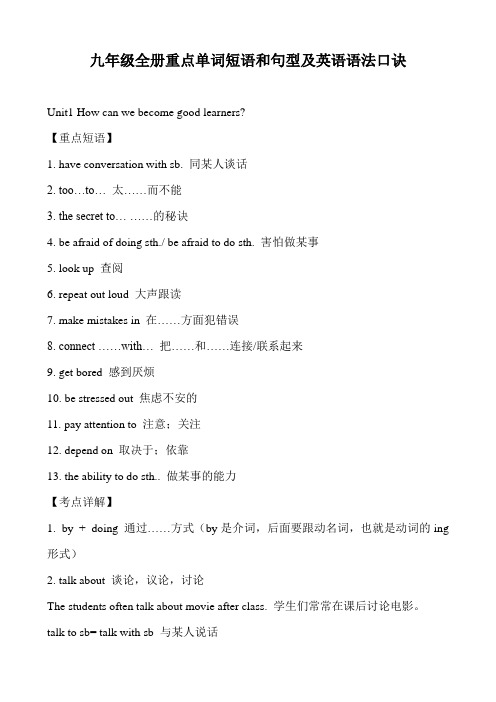
九年级全册重点单词短语和句型及英语语法口诀Unit1 How can we become good learners?【重点短语】1. have conversation with sb. 同某人谈话2. too…to… 太……而不能3. the secret to… ……的秘诀4. be afraid of doing sth./ be afraid to do sth. 害怕做某事5. look up 查阅6. repeat out loud 大声跟读7. make mistakes in 在……方面犯错误8. connect ……with… 把……和……连接/联系起来9. get bored 感到厌烦10. be stressed out 焦虑不安的11. pay attention to 注意;关注12. depend on 取决于;依靠13. the ability to do sth.. 做某事的能力【考点详解】1. by + doing 通过……方式(by是介词,后面要跟动名词,也就是动词的ing 形式)2. talk about 谈论,议论,讨论The students often talk about movie after class. 学生们常常在课后讨论电影。
talk to sb= talk with sb 与某人说话3. 提建议的句子:①What/ how about +doing sth.? 做…怎么样?(about后面要用动词的ing形式,这一点考试考的比较多)如:What/ How about going shopping?②Why don't you + do sth.? 你为什么不做…?如:Why don't you go shopping?③Why not + do sth. ? 为什么不做…?如:Why not go shopping?④Let's + do sth. 让我们做…...吧。
初三重点英语单词句型及语法
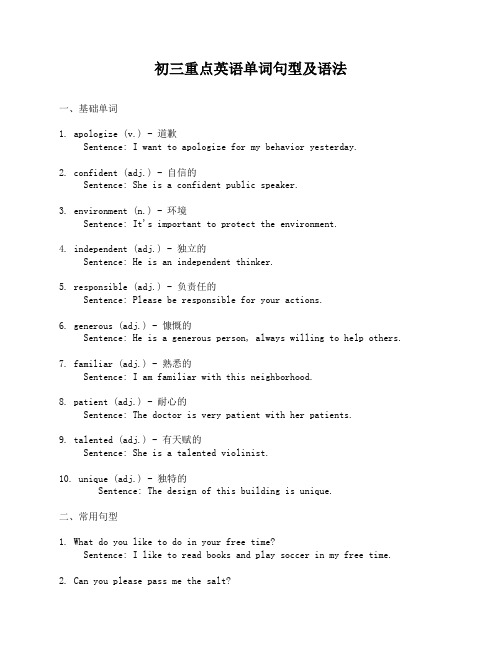
初三重点英语单词句型及语法一、基础单词1. apologize (v.) - 道歉Sentence: I want to apologize for my behavior yesterday.2. confident (adj.) - 自信的Sentence: She is a confident public speaker.3. environment (n.) - 环境Sentence: It's important to protect the environment.4. independent (adj.) - 独立的Sentence: He is an independent thinker.5. responsible (adj.) - 负责任的Sentence: Please be responsible for your actions.6. generous (adj.) - 慷慨的Sentence: He is a generous person, always willing to help others.7. familiar (adj.) - 熟悉的Sentence: I am familiar with this neighborhood.8. patient (adj.) - 耐心的Sentence: The doctor is very patient with her patients.9. talented (adj.) - 有天赋的Sentence: She is a talented violinist.10. unique (adj.) - 独特的Sentence: The design of this building is unique.二、常用句型1. What do you like to do in your free time?Sentence: I like to read books and play soccer in my free time.2. Can you please pass me the salt?Sentence: Sure, here you go.3. I'm sorry, but I can't attend the party tonight.Sentence: That's okay, maybe next time.4. How was your weekend?Sentence: My weekend was great, I went hiking with my family.5. Could you please help me with my homework?Sentence: Of course, I would be happy to help.6. What time does the movie start?Sentence: The movie starts at 7:30 PM.7. Where is the nearest bus stop?Sentence: The nearest bus stop is just around the corner.8. I'm really excited about the school trip next week.Sentence: Me too, it's going to be a lot of fun.9. What do you want to be when you grow up?Sentence: I want to be a doctor and help people.10. How do you spell your name?Sentence: My name is spelled J-O-H-N.三、语法1. Present Simple Tense (一般现在时)- 表示经常发生的动作或事实。
初中英语所有重要的语法规则、句型

初中英语所有重要的语法规则、句型
1. 时态
- 一般现在时:表示经常性或普遍性动作,或者事实、真理等。
- 一般过去时:表示过去某个时间发生的动作或情况。
- 一般将来时:表示将要发生的动作或情况。
2. 现在进行时
- 表示正在进行的动作。
- 结构:be动词(am, is, are)+ 现在分词。
3. 一般过去时
- 表示过去某个时间发生的动作或情况。
- 结构:动词的过去式。
4. 情态动词
- 表示能力、可能性、必要性等。
- 常见的情态动词有:can, could, may, might, must, will, would, should。
5. 被动语态
- 表示动作的承受者在句中作主语。
- 结构:be动词 + 过去分词。
6. 感叹句
- 用来表达惊讶、赞美、喜悦等强烈感情。
- 结构:How + adj./adv. + 主语 + 动词!
7. 条件句
- 表示某种条件下可能发生的情况。
- 结构:if + 条件从句,主句。
8. 祈使句
- 用于表示命令、请求、建议等。
- 结构:动词原形 + ...
9. 疑问句
- 用于提问。
- 一般疑问句结构:助动词/情态动词 + 主语 + 动词原形?
10. 介词
- 用于表示关系、位置、方向等。
- 常见的介词有:in, on, at, for, with, to, from, before, after, etc.
以上是初中英语中的一些重要的语法规则和句型,希望对你有帮助!。
英语七上重点词汇 单词 语法句型

英语七上重点词汇单词语法句型英语七年级上册的重点词汇主要是初中英语词汇的基础,也是基础性词汇。
下面将分别介绍一下这些单词的意义,以及常用语法句型。
一、单词1. family:家庭2. sister:姐妹3. brother:兄弟4. mother:母亲5. father:父亲6. aunt:姑妈/舅妈7. uncle:叔叔/舅舅8. grandmother:外婆/祖母9. grandfather:外公/祖父10. cousin:表兄弟姐妹11. friend:朋友12. classmate:同学13. teacher:老师14. student:学生15. school:学校16. book:书17. pen:笔18. pencil:铅笔19. eraser:橡皮20. ruler:尺子21. ballpoint pen:圆珠笔22. desk:书桌23. chair:椅子24. blackboard:黑板25. classroom:教室二、语法句型1. 一般现在时一般现在时表示一个经常发生的动作或状态。
规则动词加 s/es 后缀,I/we/you/they/he/she/it 都一样。
例如:She often walks to school.(她经常步行去学校。
)I like playing basketball.(我喜欢打篮球。
)2. 数量词数量词用于表示数量,如数目、重量、尺寸等。
例如:I have two books.(我有两本书。
)She weighs 45 kg.(她体重45公斤。
)3. 形容词的比较级比较级用于比较两个或两个以上的人或物之间的差异。
通常在形容词前加 er。
例如:My sister is taller than me.(我姐姐比我高。
)This pen is longer than that one.(这支笔比那支长。
)4. 情态动词 can 和can’tcan 表示“能够”、“会”、“可以”;can’t 表示“不能”。
2024 人教版七年级英语上册知识点

2024人教版七年级英语上册知识点1.Starter Unit1Good morning!(1)重点短语:∙Good morning!(早上好!)∙Good afternoon!(下午好!)∙Good evening!(晚上好!)∙How are you?(你好吗?)∙I'm fine,thanks.(我很好,谢谢。
)(2)例句:∙Good morning,Miss Li!(早上好,李老师!)∙Good afternoon!Nice to see you.(下午好!很高兴见到你。
)∙Good evening!What are you doing?(晚上好!你在做什么?)∙How are you today?(你今天怎么样?)∙I'm fine,thanks.And you?(我很好,谢谢。
你呢?)(3)重点语法:∙字母的读音和书写:掌握26个英文字母的大小写形式、读音及基本书写规范,这是学习英语的基础。
∙音标基础:初步接触一些简单的音标,为后续学习单词的正确发音做准备,比如元音音标/æ/、/e/、/ɪ/等和一些简单的辅音音标/p/、/b/、/t/等。
∙Be动词的简单用法:学习Be动词am、is、are的最基本用法。
在这个单元中,主要让学生了解I搭配am,you搭配are,这是最基础的Be动词搭配形式。
2.Starter Unit2What's this in English?:(1)重点单词:map(地图)cup(杯子)ruler(尺子)pen(钢笔)orange(橙子)jacket(夹克衫)key(钥匙)quilt(被子)what(什么)in(在……里)English(英语;英文)。
(2)重点短语:∙询问物品:What's this in English?(这个用英语怎么说?)、What's that inEnglish?(那个用英语怎么说?)∙回答方式:It's a/an...(它是一个……)。
人教版高中英语(必修3)重点词汇、短语、句型、语法全汇总

人教版高中英语(必修3)重点词汇、短语、句型、语法全汇总Unit1 Festivals around the world重点词汇1.take place 发生2.religious 宗教的3.in memory of 纪念4.belief 信任,信心,信仰5.dress up 盛装,打扮6.trick 诡计,窍门7.play a trick on 搞恶作剧,诈骗8.gain 获得9.gather 搜集,集合10.award 奖品,授予11.admire 赞美,钦佩12.look forward to 期望,盼望13.day and night 日夜14.as though 好像15.have fun with 玩的开心16.permission 许可,允许17.turn up 出现,到场18.keep one's word 守信用19.hold one's breath 屏息20.apologize道歉21.obvious 显然的22.set off 出发,动身,使爆炸重点短语1.mean doing sth. 意味着mean to do sth. 打算或企图做某事mean sb. to do sth. 打算让某人做某事be meant for 打算作……用; 为…而有2.take place 发生;举行3.of all kinds 各种各样的4.starve to death 饿死be starved of 缺乏starve for sth, starve to do 渴望5.plenty of 大量; 充足6.be satisfied with对......感到满意to one's satisfaction令某人感到满意7.do harm to sb.=do sb. harm 伤害某人8.in the shape of 呈…的形状,以…的形式9.in memory of/ to the memory of sb.纪念某人10.dress up 穿上最好的衣服;打扮,化装11.award sth.(to sb.)和award sb.sth.(for sth.) 颁奖reward sb. for sth. 因…奖赏某人reward sb. with sth. 用某物酬劳某人12.admire sb. for sth在某方面钦佩某人13.look forward to期望,期待,盼望14.have fun with(与某人)玩得开心;过得快乐( have a good time;enjoy oneself.)15. turn up 出现;调大/高turn down 拒绝;调小/低turn off 关掉turn on 打开turn out 结果是......turn to sb. for help 向某人求助16.keep one's word 守信用break one's word, 失信17.It be obvious that-clause显而易见;一目了然18.set off 出发; 使(地雷、炸弹)爆炸set in 开始set up 建立,创立set out to do = set about doing sth. 着手做set down 写下,记下19.remind sb. of sth. 提醒,使想起重点句型1.Please make sure when and where the accident took place.请查清楚事故是何时何地发生的。
人教版英语七年级下册unit1+2核心考点归纳(语法+词汇+短语+重点句子)

人教版七年级下册unit1+2核心考点及语法归纳【unit 1语法】一、情态动词can的基本用法情态动词can有一定的词义,但不能独立存在,它必须与动词原形一起构成谓语。
can没有人称和数的变化。
其具体用法如下:1.表示"能、会",指脑力或体力方面的"能力"。
例如:I can speak English.我会讲英语。
Jim can swim but I can't.吉姆会游泳,但我不会。
2.表示"可能",常用于否定句或疑问句中,指某种可能性。
例如:Han Mei can't be in the classroom.韩梅不可能在教室里。
Can he come here today, please?请问他今天能到这里来吗?3.表示"可以",常用于口语中,指许可或请求做某事。
例如:Can I have a cup of tea, please?请问我可以喝一杯茶吗?You can go out.你可以出去了?二、情态动词的注意事项1. can的口诀:情态动词can、can、can,动词原形跟后面。
变疑问can提前,变否定not后面加上去。
主语人称单复数,情态动词不能变。
2. 情态动词can可以引导肯定句和疑问句。
肯定句:主语+ can + 动词原形+ 其他成分疑问句:can + 主语+ 动词原形+ 其他成分3.can 引导的肯定句变为疑问句的方法:(一调二改三问号)can 提前,首字母大写。
(一调)肯定句中主语在变成疑问句时的变化。
(二改)如:肯定句:You can feed the animals.你可以喂动物。
疑问句:Can I feed the animals?我能喂动物吗?在句尾后面加问号。
(三问号)4. Can的一般疑问句回答:肯定回答:Yes,主语(必须人称代词)+ can.否定回答:No,主语(必须人称代词)+ can not (can’t)/mustn’t. Yes 或no 后要使用逗号,除了I 以外,其他人称都要小写。
【人教】七年级上册英语重点单词、短语、语法
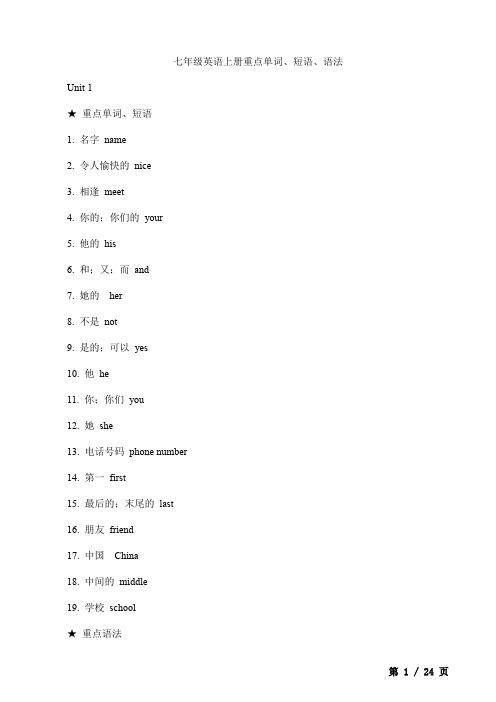
七年级英语上册重点单词、短语、语法Unit 1★重点单词、短语1. 名字name2. 令人愉快的nice3. 相逢meet4. 你的;你们的your5. 他的his6. 和;又;而and7. 她的her8. 不是not9. 是的;可以yes10. 他he11. 你;你们you12. 她she13. 电话号码phone number14. 第一first15. 最后的;末尾的last16. 朋友friend17. 中国China18. 中间的middle19. 学校school★重点语法人称代词主格和形容词性物主代词【比武大擂台】1. I am a girl. 我是一个女孩。
2. He/She is my friend. 他/她是我的朋友。
3. You are very nice. 你非常好。
4. It is a bed. 它是一张床。
5. My name is Mary. 我的名字叫玛丽。
6. Your room is so tidy. 你的房间很整洁。
7. This is his/her pen. 这是他/她的钢笔。
8. That is my dog. Its name is Susan.那是我的狗。
它的名字叫苏珊。
【各显神通】人称代词主格一般放在句首,在句中作主语,如例句1、2、3、4。
I 作主语时,be 动词用am;she/he/it 作主语时,be动词用is。
形容词性物主代词不能单独使用,其后必须跟名词,如例句5、6、7、8。
Unit 2★重点单词、短语1. 姐;妹sister2. 兄;弟brother3. 妈妈mother4. 爸爸father5.(外)祖父母grandparents6. 我的家人my family7. 你的父母your parents8. 过得愉快have a good day9. 这/那是……This/That is ...10. 这些/那些是……These/Those are ...11. 见到你很高兴。
人教版高中英语必修3重点词汇、短语、句型、语法大全
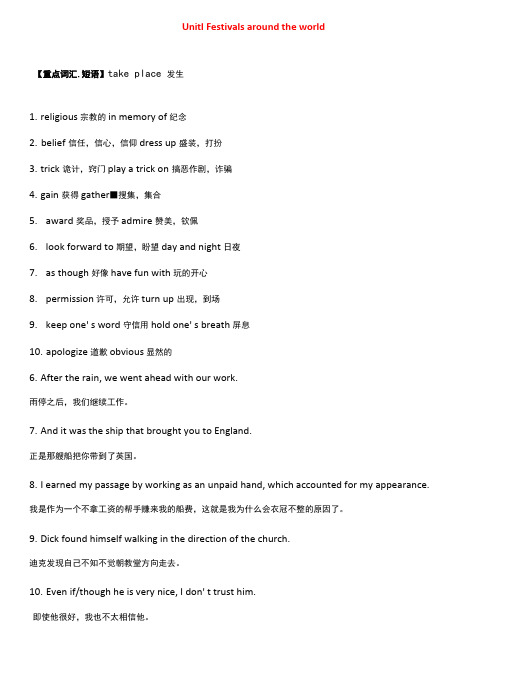
Unitl Festivals around the world【重点词汇.短语】take place 发生1.religious 宗教的in memory of 纪念2.belief信任,信心,信仰dress up盛装,打扮3.trick诡计,窍门play a trick on搞恶作剧,诈骗4.gain获得gather■搜集,集合5.award奖品,授予admire赞美,钦佩6.look forward to 期望,盼望day and night 日夜7.as though 好像have fun with 玩的开心8.permission 许可,允许turn up出现,到场9.keep one' s word 守信用hold one' s breath 屏息10.apologize 道歉obvious 显然的6.After the rain, we went ahead with our work.雨停之后,我们继续工作。
7.And it was the ship that brought you to England.正是那艘船把你带到了英国。
8.I earned my passage by working as an unpaid hand, which accounted for my appearance. 我是作为一个不拿工资的帮手赚来我的船费,这就是我为什么会衣冠不整的原因了。
9.Dick found himself walking in the direction of the church.迪克发现自己不知不觉朝教堂方向走去。
10.Even if/though he is very nice, I don' t trust him.即使他很好,我也不太相信他。
【语法总结】名词性从句在句子中起名词作用的句子叫名词性从句(Noun Clauses),名词性从句的功能相当于名词词组,它在复合句中能担任主语、宾语、表语、同位语等,因此根据它在句中不同的语法功能,名词性从句又可分别称为主语从句、宾语从句、表语从句和同位语从句。
准初一生预习:七年级上册英语unit1重点单词短语及语法句型
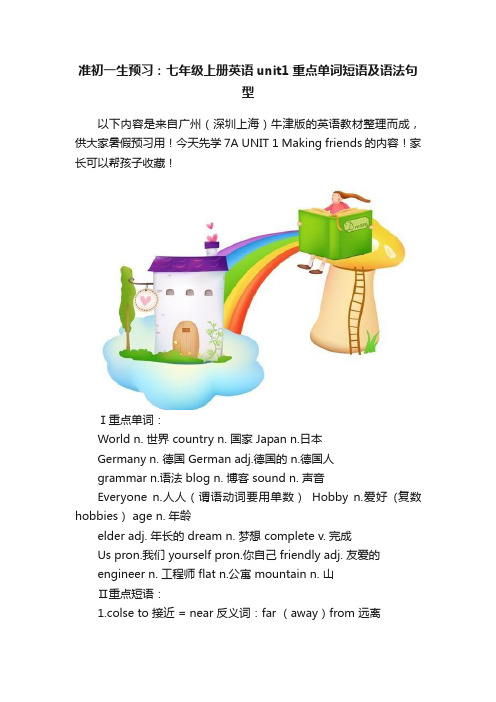
准初一生预习:七年级上册英语unit1重点单词短语及语法句型以下内容是来自广州(深圳上海)牛津版的英语教材整理而成,供大家暑假预习用!今天先学7A UNIT 1 Making friends的内容!家长可以帮孩子收藏!Ⅰ重点单词:World n. 世界 country n. 国家 Japan n.日本Germany n. 德国 German adj.德国的 n.德国人grammar n.语法 blog n. 博客 sound n. 声音Everyone n.人人(谓语动词要用单数)Hobby n.爱好(复数hobbies) age n. 年龄elder adj. 年长的 dream n. 梦想 complete v. 完成Us pron.我们 yourself pron.你自己 friendly adj. 友爱的engineer n. 工程师 flat n.公寓 mountain n. 山Ⅱ重点短语:1.colse to 接近 = near 反义词:far (away)from 远离2.Go to school 去上学3.Be good at 擅长 =do well in 反义词:be bad /poor at=do badly in不擅长4.Make friends with 与……交朋友 make friends 交朋友5.All over 遍及6.I’d like to=would like to 愿意Ⅲ重点句型:1.what does···mean?2.welcome to3.I like···because···4.My dream is to be··?5.How old is/are ····?6.What does ····do?详细讲解:1.Read a German girl’s blog。
小学英语总复习重点单词短语句型语法总汇
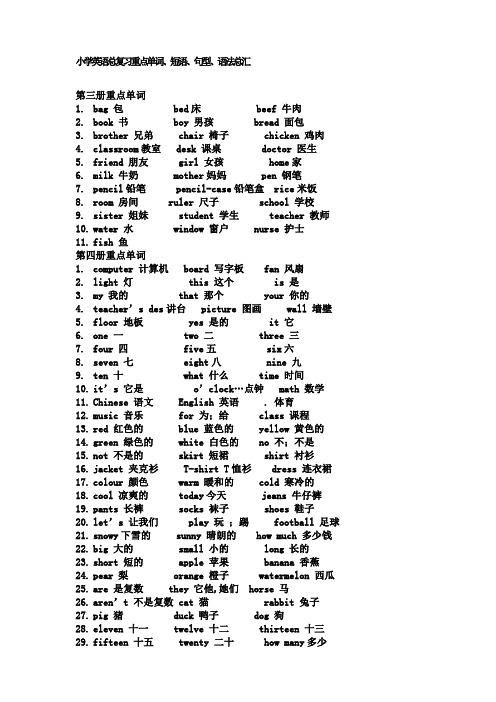
小学英语总复习重点单词、短语、句型、语法总汇第三册重点单词1.bag 包 bed床 beef 牛肉2.book 书 boy 男孩 bread 面包3.brother 兄弟 chair 椅子 chicken 鸡肉4.classroom教室 desk 课桌 doctor 医生5.friend 朋友 girl 女孩 home家k 牛奶 mother妈妈 pen 钢笔7.pencil铅笔 pencil-case铅笔盒 rice米饭8.room 房间 ruler 尺子 school 学校9.sister 姐妹 student 学生 teacher 教师10.water 水 window 窗户 nurse 护士11.fish 鱼第四册重点单词puter 计算机 board 写字板 fan 风扇2.light 灯 this 这个 is 是3.my 我的 that 那个 your 你的4.teacher’s des讲台 picture 图画 wall 墙壁5.floor 地板 yes 是的 it 它6.one 一 two 二 three 三7.four 四 five五 six六8.seven 七 eight八 nine 九9.ten 十 what 什么 time 时间10.it’s 它是o’clock…点钟 math 数学11.Chinese 语文 English 英语 . 体育12.music 音乐 for 为;给 class 课程13.red 红色的 blue 蓝色的 yellow 黄色的14.green 绿色的 white 白色的 no 不;不是15.not 不是的 skirt 短裙 shirt 衬衫16.jacket 夹克衫 T-shirt T恤衫 dress 连衣裙17.colour 颜色 warm 暖和的 cold 寒冷的18.cool 凉爽的 today今天 jeans 牛仔裤19.pants 长裤 socks 袜子 shoes 鞋子20.let’s 让我们 play 玩;踢 football 足球21.snowy下雪的 sunny 晴朗的 how much 多少钱22.big 大的 small 小的 long 长的23.short 短的 apple 苹果 banana 香蕉24.pear 梨 orange 橙子 watermelon 西瓜25.are 是复数 they 它他,她们 horse 马26.aren’t 不是复数 cat 猫 rabbit 兔子27.pig 猪 duck 鸭子 dog 狗28.eleven 十一 twelve 十二 thirteen 十三29.fifteen 十五 twenty 二十 how many多少30.there 那儿;那里第五册重点单词1.smart 聪明的 old 年老的 thin 瘦的2.funny 滑稽可笑的 tall 高的 active活跃的3.but 但是 quiet 安静;文静的very 很;非常4. young 年轻的 strong 强壮的 kind和蔼亲切的5. Mr. 先生 short 矮的 like 像;喜欢6. strict严格的who’s=who is是谁what’s=what is是什么7. he’s=he is他是she’s=she is她是 Monday星期一8. Tuesday 星期二 Wednesday星期三 Thursday星期四9. Friday 星期五 Saturday星期六 Sunday 星期天10. day 天;日子 have 有;吃 on在……时候11. too 太;也 grape 葡萄don’t=do not不要水果 salty咸的 fresh 新鲜的最喜爱的tasty 好吃的 fish 鱼茄子酸的 we 我们 lunch午饭;中餐西红柿 potato 土豆 tofu 豆腐beans青豆they’re=they are 他她;它们是窗帘 trash bin 垃圾桶 closet 衣橱镜子 end table 床头柜 bedroom卧室厨房 bathroom 卫生间 living room 客厅20. in 在…里 on 在…上 under 在…下21. near在…附近 behind 在…后面 clothes 衣服22. river 河流 flower 花 grass 草23. lake 湖泊 forest 森林 path 小路24. park 公园 house房子 bridge 桥25. tree 树木 road 路;公路 building 建筑物26. clean 干净的 eggplant 茄子 sweet 甜的第五册重点短语1. English teacher2. math teacher英语老师数学老师3. Chinese teacher4. have an English class语文老师上一节英语课5. on Wednesdays6. do my homework在星期三做作业TV 8. read books看电视看书9. play computer games 10. my favourite玩计算机游戏我最爱的11. favourite fruit 12. sweep the floor最喜欢的水果扫地13. cook the meals 14. clean the room做饭清洁房间15. water the flowers 16. wash the clothes浇花洗衣服17. set the table 18. make the bed摆餐具铺床19. do the dishes 20. clean the bedroom洗碗碟清洁卧室21. use a computer 22. near the table用计算机桌子旁边23. under the bed 24. over the river床下河上方25. on the desk 26. behind the door书桌上门后面27. in the closet 28. a picture of my room衣橱里一张我房间的照片第六册重点单词1. Apr.四月 at 在……点钟 Aug. 八月2. because 因为 best 最;极 birthday 生日3. date日期 Dec. 十二月 evening夜晚;晚上4. fall 秋天 Feb. 二月 fly 飞5. grandpa爷爷;外公 her 她的 Jan. 一月6. July 七月 June 六月 May 五月7. Mar. 三月 Mom 妈妈 noon 中午8. Nov. 十一月 Oct. 十月 often 经常9. season 季节 Sept. 九月 skate 滑冰10. sleep 睡觉 sometimes有时候 spring 春天11. summer 夏天 swim 游泳 uncle 叔叔12. usually 通常;一般 why 为什么 weekend周末13. which 哪一个 winter 冬天 honey 蜂蜜14. study 书房 jump 跳 run 跑15. kangaroo 袋鼠 climb 往上爬 fight 打架16. swing 荡;荡秋千第六册重点短语1. do morning exercises2. eat breakfast晨练吃早饭3. eat dinner4. fly kites吃晚饭放风筝5. get up6. go hiking起床去远足7. climb mountains 8. climb trees爬山爬树9. go shopping 10. have English class购物上英语课11. make a snowman 12. plant trees堆雪人种树13. play sports 14. play the piano进行体育运动弹钢琴15. visit grandparents 16. draw pictures看望祖父母画画17. cook dinner 18. read a book做饭看书19. answer the phone 20. listen to music接电话听音乐21. clean the room 22. write a letter打扫房间写信23. write an e-mail 24. drink water写电子邮件喝水25. watch insects 26. take pictures观察昆虫照相27. pick up leaves 28. do an experiment采摘树叶做实验29. catch butterflies 30. count insects捉蝴蝶数昆虫31. collect leaves收集树叶32. write a report写报告33. play chess 下棋 34. have a picnic举行野餐第七册重点单词1.by经;乘… foot脚 bike 自行车2.bus 公共汽车 train 火车 how 怎样3.traffic交通 stop停;停车站 wait等;等待4.library 图书馆 post office 邮局 hospital 医院5.cinema 电影院 bookstore 书店 where 哪里6.please 请 turn转弯 right 右边7.left 左边 straight 成直线地 then然后ic book 漫画书 post card 明信片 newspaper报纸9.buy购买 hobby爱好 dive 跳水10.live 居住 teach教 go 去11.watch 观看 read 读;看 does 助动词12.doesn’t否定助动词 singer 歌唱家 writer作家13.actor 男演员 actress 女演员 artist 画家 reporter电视台记者 engineer 工程师15.accountant 会计 policeman 警察16.salesperson 销售员 cleaner 清洁工17.work 工作 rain 雨;下雨 cloud 云;云彩18.sun 太阳 stream 小溪;小河 seed 种子19.soil 泥土 sprout 苗;嫩芽 plant 植物;种植20.should 应该 then 然后第七册重点短语1.on foot 走路2. by train 坐火车3. by bus4. by bike坐公共汽车骑自行车plane 6. stop at a red right坐飞机红灯停at a yellow light 8. go at a green light黄灯等绿灯走9. traffic light 10. near the post office交通灯邮局附近11. next to the hospital 12. turn left医院隔壁与医院相邻转左13. turn right 14. go straight转右直走15. get on 16. get off上车下车a trip 18. read a magazine去旅行看杂志19. go to the cinema 20 . this morning看电影今天早上21. this afternoon 22. this evening今天下午今天晚上23. next week 24. collect stamps下周集邮25. make kites 26. ride a bike制作风筝骑自行车27. play the violin 拉小提琴 28. go to work 上班29. watch TV at night 30. read newspapers晚上看电视看报纸31. teach English 32. live in Beijing教英语住在北京33. come from 34. plant flower seeds来自种花种第八册重点单词:1.taller 更高的 shorter 更矮的 stronger 更强壮的2.older 年纪更大的 younger更年轻的 bigger更大的3.heavier 更重的 longer更长的 thinner更瘦的4.smaller 更小的 hurt疼痛:受伤 matter事情5.sore 疼的 nose 鼻子 tired 疲劳的6.excited 兴奋的 angry 生气的 happy高兴的7.bored 无聊的 sad 伤心的 last上一个;最后的8.weekend 周末 to 向:朝 park 公园9.Chinese 汉语;中国的good 好的 present礼物10.boat 小船 elephant大象 how 怎样;多么11.watch-watched观看 wash-washed洗12.clean-cleaned 打扫 play-played玩13.visit-visited看望;拜访;参观 do-did做14.go-went 去 read-read 读:阅读15.learn-learned 学习 dance- danced跳舞16.eat-ate吃 take-took 照;拍17.climb-climbed 爬 have-had 有18.buy-bought 买 row-rowed 划19.see-saw看见 leave-left 离开20.get-got 到达第八册重点短语1.taller than…比……高2. have a fever 发烧2.have a cold 感冒 4. have a toothache 牙疼5. have a headache 头疼6. have a sore throat 喉咙疼7. watch TV 看电视 8. wash clothes 洗衣服9. play football 踢足球 10. visit grandparents 看望祖父母11. go to a park 去公园 12. read a book 看书7. go swimming 去游泳 8. go fishing 去钓鱼9. went hiking 去远足 10. learn Chinese 学习汉语11. sing and dance 唱歌跳舞 good food 吃美食1.take pictures 照相 14. buy presents 买礼物2.row a boat 划船 16. see elephant 看大象3.go skiing 去滑雪 18. go ice-skating 去滑冰第四册重点句型1.This is my computer. 这是我的计算机;2.That is your computer. 那是你的计算机;3.Is this a teacher’s desk 这是讲台吗4.Yes, it is. 是的,它是;5.What time is it 几点了6.It’s two o’cloc k. 两点锺了;7.It’s 9:45. It’s time for math class.8.九点四十五分了;该上数学课了;9.Is this your T-shirt 这是你的T恤衫吗10.No, it isn’t. 不,不是;11.What colour is it 它是什么颜色的12.It’s white. 它是白色的;13.It’s warm today. 今天很暖和;14.Let’s play football. 让我们踢足球吧;15.It’s cool. 天气凉爽;16.Is it cool 天气凉爽吗17.How much is it 它要多少钱18.It’s ten yuan. 它要十元钱;19.How much are they 它们要多少钱20.They’re three yuan. 它们要三元钱;21.Are they ducks 它们是鸭子吗22.No, they aren’t. 不,它们不是;23.How many horses are there 有多少匹马24.Twelve.十二匹;第五册重点句型1.Who’s your English teacher 你的英语老师是谁2.Mr. Carter. 卡特先生;3.Wh at’s he like 他是什么样子的4.He’s tall and strong. 他又高又强壮;5.Is she quiet 她文静吗6.No, she isn’t. She’ very active. 不,她不是;她很活跃;7.Is she strict 她严格吗8.Yes, she is. 是的,她是;9.But she’s very kind. 但她很亲切;10.What day is it today 今天是星期几11.It’s Wednesday. 是星期三;12.What do you have on Thursdays 星期四你有上什么课13.We have English, math and science.星期四我们有上英语、数学和科学;14.What do you do on Saturdays 星期六你做什么15.I watch TV on Saturday. 星期六我看电视;16.What about you, Chen Jie 陈洁,你呢17.I do my homework, too.我也做作业;18.What do you have for lunch on Mondays星期一午饭你你们吃什么19.We have tomatoes, tofu and fish. 我们吃西红柿、豆腐和鱼;20.What’s your favourite fruit 你最爱的水果是什么21.I like apples. They’re sweet. 我喜欢苹果;它们甜;22.I like fruits. But I don’t like grapes.我喜欢水果;但我不喜欢葡萄;23.They’re sour. 它们酸;24.What can you do 你会做什么25.I can sweep the floor. 我会扫地;26.I can cook the meals. 我会煮饭;27.I can water the flowers. 我会浇花;28.Can you make the bed No, I can’t. 你会铺床吗不会;29.Can you use a computer 你会使用计算机吗30.Yes, I can. 会,我会;31.There are two bedrooms, a kitchen, a bathroom and a living room.那有两间卧室、一个厨房、一个卫生间和一个起居室;32.There’s a mirror, a bed and a big closet.那有一面镜子、一张床和一个大衣橱;33.Many clothes are in the closet. 许多衣服在大衣橱里面;34.The trash bin is behind the door. 垃圾箱在门后面;35.Is there a forest in the park Yes, there is.在公园里有森林吗有;36.Is there a river No, there isn’t. 有河流吗没有;37.Are there any pandas in the mountains No, there aren’t.在山上有一些熊猫吗没有;38.Are there any fish in the river Yes, there are. 在河里有鱼吗有;第六册重点句型1.When do you eat dinner 你什么时候吃晚饭2.I eat dinner at 7:00 in the evening. 我晚上7:00吃晚饭;3.When do you get up 你什么时候起床4.I usually get up at 12:00 at noon. 我通常中午12:00起床;5.What do you do on the weekend 你周末做什么ually I watch TV and go shopping. 我通常看电视和买东西;7.Sometimes I visit my grandparents. 我有时看望祖父母;8.I often play football. Sometimes I go hiking.我经常踢足球;有时去远足;9.Which season do you like best 你最喜欢哪一个季节10.I like winter best. 我最喜欢冬天;11.Summer is good, but fall is my favourite season.夏天不错,但秋天是我最喜欢的季节;12.Why do you like summer 你为什么喜欢夏天13.Because I can swim in the lake. 因为我可以在湖里游泳;14.Why do you like winter 你为什么喜欢冬天15.Because I can sleep a long time. 因为我可以睡长一点;16.When is your birthday 你的生日是什么时候17.It’s in May. 在五月;18.My birthday is in June. 我的生日在六月;19.Uncle Bill’s birthday is in June, too. 比尔叔叔的生日也在六月;20.Is her birthday in June Yes, it is. 她的生日在六月吗是的;21.What’s the date 是几号22.June 9th .六月九日;23.Who’s that This is Zhang Peng. 电话中你是谁我是张鹏 ;24.What are you doing 你在干什么25.I’m doing the dishes. 我在洗碗碟;26.I’m reading a book. 我在看书;27.Grandpa is writing a letter. 爷爷在写信;28.Brother is doing homework. 哥哥在做作业;29.Mom is cooking dinner in the kitchen. 妈妈在厨房里做饭;30.He’s writing an e-mail in the study. 他在书房里写电子邮件;31.What is it doing 它在干什么32.It’s eating bananas. 它在吃香蕉;33.She’s jumping. 她在跳;34.What are they doing 它们在干什么35.They are swimming. 它们在游泳;36.They are climbing trees. 它们在爬树;37.Are you eating lunch 你们在吃午餐吗No, we aren’t. 不,我们不是;Are they eating the honey 它们在吃蜂蜜吗Yes, they are. 是的,它们是;Is he playing chess 他在下棋吗Yes, he is. 是的,他在;Is she counting insects 她在数昆虫吗No, she isn’t. 不,她不在;第七册重点句型1.How do you go to school ,Sarah莎拉,你怎样上学2.ually I go to school on foot我通常走路上学4.Sometimes I go by bike. 有时骑车;5.How can I get to Zhongshan Park 我怎样去中山公园6.You can go by the bus. 你可以坐15路车去;7.where is the cinema, please 请问电影院在哪里8.It’s next to the hospital. 它在医院旁边;9.Turn left at the cinema, then go straight. 在电影院转左,然后直走;10.It’s on the left. 它在左边;11.What are you going to do on the weekend周末你打算做什么12.I’m going to visit my grandparents this weekend.我这个周末打算去看望祖父母;13.Where are you going this afternoon 今天下午将去哪里14.I’m going to the bookstore. 我将去书店;15.What are you going to buy 你准备买点什么16.I’m going to buy a comic book. 我准备买一本漫画书;17.what’s your hobby 你的爱好是什么18.I like collecting stamps.我喜欢集邮;19.He likes collecting stamps, too. 他也喜欢集邮;20.Does she teach English No, she doesn’t. 她教英语吗不是;21.Does she teach you math Yes, she does.她教你们数学吗是的;22.What does your mother do 你的妈妈干什么工作23.She is a TV reporter. 她是电视台记者;24.Where does she work 她在哪里上班25.She works in a library. 她在图书馆上班;26.How does she go to work 她怎样上班27.She goes to work by bus. 她坐公共汽车上班;28.Where does the rain come from 雨来自哪里29.It comes from the clouds. 它来自云;30.How do you do that 你怎样做31.What should you do then 然后你应该做什么第八册重点句型1.How tall are you 你多高2.I’m 164cm tall. 我164厘米高;3. I’m shorter than you . 我比你矮;4.You’re 4cm taller than me . 你比我高4厘米;5.How heavy are you 你多重6.I’m 48kg. 我48公斤重;7.I’m thinner than you, and shorter. 我比你瘦,比你矮;8.I’m bigger and stronger than you . 我个子比你大,比你强壮;9.How do you feel 你感觉怎么样10.I feel sick. 我觉得不舒服;11.What’s the matter 怎么啦12.I have a headache..toothache, cold, fever, sore throat.我头疼;牙疼,感冒,发烧,喉咙疼13.My throat is sore. 我的喉咙疼;14.My nose hurts. 我的鼻子伤了;15.How are you, Liu Yun 刘云,你怎么样16.You look so happy. 你看起来这么快乐;17.I’m excited. 我兴奋;18.How are you, Sarah 莎拉,你怎么样19.You look sad today. 你今天看起来伤心;20.What did you do last weekend 上个周末你做什么21.I played football. 我踢足球;22.I visited my grandparents. 我拜访祖父母;23.What did you do yesterday 你昨天做了什么24.I went fishing. 我去钓鱼;25.Did you read books 你看了书吗26.Yes, I did. 看了;27.Did you clean your room 你打扫了房间吗28.No, I didn’t. 没有;29.Where did you go on your holiday 假日你去了哪里30.I went to Xinjiang. 我去了新疆;31.How did you go there 你怎样去那的32.I went by train. 我坐火车去的;小学英语单词按字母顺序列示Aactive积极的;活跃的 actor男演员 actress 女演员 accountant会计and和 angry生气的 answer the phone接电话 apple苹果 Apr.四月缩写aren’t = are not are是 artist 画家what about……怎么样 at在…点钟 Aug. 八月缩写Bbanana 香蕉 bag包 bathroom卫生间 because因为 bedroom 卧室bed床 beef牛肉 behind在……后边 best最;极 bigger体型更大的 big大的 bike自行车 birthday生日 blue 蓝色的 board 写字板boat 小船 book 书 bored无聊的,烦人的 boy男孩 bread面包bridge桥brother兄弟building 建筑物but 但是buy 购买buy—bought 买 by 经…;乘Ccan’t = can not cat 猫 catch butterfly捉蝴蝶 chair椅子 chicken 鸡肉 Chinese 语文 Chinese 中文,汉语 cinema电影院 class 课程classroom教室 clean the bedroom打扫卧室 clean the room打扫房间clean—cleaned打扫 cleaner 清洁工 clean干净的 climb mountains爬山 climb—climbed 爬 climb往上爬 closet壁橱;衣橱 clothes衣服cloud云;云彩cold 寒冷的 collect stamps集邮ing形式:collecting stampscolour 颜色 come from来自…;从…来 computer 计算机 cool 凉爽的Ddance—danced 跳舞 date日期 day天;日子 Dec. 十二月缩写 desk课桌;书桌 dive跳水ing形式:diving do homework 做作业 doctor医生 do—did does doesn’t = does not dog 狗don’t =do not door门 dress 连衣裙 drink water喝水 driver司机 duck 鸭子Eeat breakfast吃早饭 eat dinner吃晚饭 eat—ate吃 egg蛋 eight 八elephant大象eleven十一English英语evening夜晚;晚上excited兴奋的Ffall秋天 farmer农民 father父亲;爸爸 favourite特别喜爱的 Feb.二月缩写 fifteen 十五 fight打架 fish 鱼 five 五 flower花fly kites放风筝 fly飞 foot 脚 football 足球 for为;给 T-shirt T 恤衫 fresh 新鲜的 FridayFri.星期五 friend朋友 funny 滑稽可笑的Gget to 到达 get up起床 get—got 到达 girl女孩 go fishing—went fishing 去钓鱼go hiking—went hiking 去郊游go hiking去远足go ice-skating—went ice-skating 去滑冰go shopping购物;买东西go skiing—went skiing 去滑雪 go swimming—went swimming去游泳 go to school 上学 go 去第三人称单数goes good 好的 go—went去 grandpa爷爷;外公 grape 葡萄 grass 草 green beans青豆 green 绿色的Hhappy高兴的 have a cold感冒 have a fever 发烧 have a headache 头疼 have a picnic举行野餐 have a sore throat喉咙疼 have a toothache 牙疼 have English class上英语课 have—had have有;吃he’s = he is heavier 更重的 her她的 hobby 爱好 home家 honey蜂蜜 horse 马 hospital医院 house 房子;住宅 how many多少 how much多少钱 how 怎样 how怎么,如何 hurt疼痛Iin 在……里面 is 是 it 它it’s = it isJjacket夹克衫 Jan.一月缩写 jeans 牛仔裤 July七月 jump跳 June六月Kkangaroo袋鼠 kind和蔼;亲切的 kitchen厨房Llake 湖泊 last 上一个 last仅余的,留在最后的 learn—learned 学习 left 左边let’s = let us library 图书馆 like像;喜欢 listen to music听音乐live 居住第三人称单数形式:lives living room客厅;起居室 long 长的 longer 更长的 lunch 中餐;午餐Mmake a kites制作风筝 ing形式:making a kites make a snowman堆雪人 make the bed 铺床 Mar.三月缩写 math 数学 matter事情,麻烦 May五月 milk牛奶mirror 镜子 mom妈妈 MondayMon.星期一 mother母亲;妈妈 Mr先生 music音乐 my我的Nnear 在……旁边 newspaper 报纸 next next week下周 nine 九 noon中午nose 鼻子 not 不;不是的 Nov. 十一月缩写 no不;不是 nurse护士Oo’clock…点钟 Oct.十月缩写 often经常 old 年老的 older 年龄更大的 on 在……上面 one一 on在……时候 orange橙子P. 体育 pants 长裤 park 公园 path 路;小道 pear梨 pencil-case铅笔盒pencil铅笔 pen钢笔 pick up leaves采摘树 picture 图画;照片 picture 照片 pig猪 plant trees种树 plant 植物;种植 play chess下棋 play sports 进行体育运动 play the piano弹钢琴 play the violin 拉小提琴ing形式:playing the violin play—played玩 play玩;踢 please请 policeman男警察 post card 明信片 post office邮局 potato 土豆 present 礼物Qquiet安静的;文静的Rrabbit兔子 rain 雨;下雨 read a book看书 read books 读书 read 读;看第三人称单数:reads read—read 读 red 红色的 rice米饭 ride a bike骑自行车ing形式:riding a bike right 右边 river河流 road公路;大道 room房间 row—rowed 划船 ruler尺子 run跑Ssad 忧伤的,悲伤的 salesperson 销售员 salty咸的 SaturdaySat.星期六school学校 season季节 seed种子 see—saw看见 Sept.九月缩写 set the table摆饭桌;摆餐具 seven七she’s = she is shirt 衬衫 shoes 鞋子 short 矮的short 短的shorter 更矮的should 应该singer歌唱家;歌手sing—sang 唱歌 sister姐妹 six 六 skate滑冰;滑冰鞋 skirt 裙子 sleep 睡觉 sleep睡觉 smaller 体型更小的 small小的 smart聪明;巧妙的 snowy下雪的 socks 袜子 soil土壤 sometimes有时候 sore 疼的 sour 酸的 spring春天 sprout苗;芽;嫩芽 straight成直线的 stream 小河;小溪 strict 严格的stronger 更强壮的 student学生 study书房 summer夏天 sun 太阳 SundaySun.星期日 sunny晴朗的 sweep the floor扫地 sweet甜的 swim游泳 swim游泳swing荡;荡秋千Ttake pictures照相 take—took 照;拍 taller更高的 tall高的 tasty好吃的;可口的 teach 教第三人称单数:teaches teacher’s desk讲台 teacher教师ten十 that 那;那个then 然后 then 然后 there那儿;那里 they 它他、她们they’re = they are thinner 更瘦的thin瘦的thirteen十三this afternoon今天下午 this evening今天晚上 this morning 今天上午 this这;这个 three三 ThursdayThu.星期四 tired疲劳的,累的 to 向;朝 to 与……相邻 today 今天 tofu豆腐 tomato 西红柿 too 也;太 traffic light交通灯traffic rule交通规则 traffic 交通 train 火车 trash bin垃圾箱 tree树TuesdayTue.星期二 turn转弯 TV reporter电视台记者 twelve十二 twenty二十 two二U2.现在进行时的肯定句基本结构为be+动词ing.3.现在进行时的否定句在be后加not;4.现在进行时的一般疑问句把be动词调到句首;动词加ing的变化规则1.一般情况下,直接加ing,如:cook-cooking2.以不发音的e结尾,去e加ing,如:make-making, taste-tasting3.如果末尾是一个元音字母和一个辅音字母,双写末尾的辅音字母,再加ing,如:run-running, stop-stopping四、be going to1.be going to 表示将要发生的事或打算、计划、决定要做的事情;2.肯定句:be going to +动词原形,如:Jim is going to play football. 否定句:be not going to +动词原形,如:Jim is not going to play football. 一般疑问句:把be动词调到句首,如:Is Jim going to play football 特殊疑问句:疑问词+be+主语+going to+动词原形如:What is Jim going to do 疑问词当主语时:疑问词+be+going to+动词原形如:Who is going to play football 五、一般过去时1.一般过去时表示过去某个时间发生的动作或存在的状态,常和表示过去的时间状语连用;一般过去时也表示过去经常或反复发生的动作感谢;2.Be动词在一般过去时中的变化:⑴am 和is在一般过去时中变为was;wasnot=wasn’t ⑵are在一般过去时中变为were;were not=weren’t ⑶带有was或were的句子,其否定、疑问的变化和is, am, are一样,即否定句在was或were后加not,一般疑问句把was或were调到句首;3.句中没有be动词的一般过去时的句子否定句:didn’t +动词原形,如:Jim didn’t go home yesterday. 一般疑问句:在句首加did,句子中的动词过去式变回原形;如:Did Jim go home yesterday 特殊疑问句:⑴疑问词+did+主语+动词原形如: What did Jim do yesterday ⑵疑问词当主语时:疑问词+动词过去式如:Who went to home yesterday动词过去式变化规则:1.一般在动词末尾加-ed,如:pull-pulled, cook-cooked2.结尾是e加d,如:taste-tasted3.末尾只有一个元音字母和一个辅音字母的重读闭音节,应双写末尾的辅音字母,再加-ed,如:stop-stopped4.以“辅音字母+y”结尾的,变y为i, 再加-ed,如:study-studied5.不规则动词过去式: am,is-was, are-were, do-did, see-saw, say-said, give-gave, get-got, go-went, come-came, have-had, eat-ate, take-took, run-ran, sing-sang, put-put, make-made, read-read, write-wrote, draw-drew, drink-drank, fly-flew, ride-rode, speak-spoke, sweep-swept, swim-swam, sit-sat六年级英语语法知识汇总一、词类:动词、名词和形容词不太容易区分,如不能一眼看出,可用如下方法:先用“一量词”如:一个、一张等和这个词连起来说,如说得通,一般认为是名词;说不通再用“很”去判断,就是把“很”和为个词连起来说,说得通一般就是形容词;都说不通就是动词;目前我们学过的,以后可能不同另外一些很明显的,如人称代词、数词、情态动词等一下就可以知道1、动词这里所说的动词是指各种动词总称,其中包括行为动词就是我们平时总说的那种动词、be动词、情态动词;1行为动词就是我们平时上课时说的动词,表示某一动作或行为;如:sweep、live等;行为动词我们已学过它们的四种形式:原形、+s/es、+ed、+ing,具体判断方法如下:↗有,就加ing读句子→读该单词→认识该单词→理解意思→看有无be动词若是be going to 就用原形↘没有,再看情态动词↗有,就用原形↗有,就加ed↘没有,再看有无表示过去的时间状语↗是第三人称单数就加s或es↘没有,再看主语↘不是第三人称单数就用原形2be动词a、Am--was Is --was Are--were 口诀:我用am, 你用are, is用在他她它,所有复数全用are;b、肯定和否定句 I am not from London. He isnot a teacher. She isnot in the dining room. My hair isnot long. Her eyes arenot small.c、一般疑问句Am I a Chinese Yes, you are. No, you aren’t. Are they American Yes, they are. No, they aren’t. Is the cat fat Yes, it is. No, it isn’t.我们现在学过的be动词大致分两类:is、am、are为一类,一般用于一般现在时、现在进行时和一般将来时中,was和were为另一类,一般用于一般过去时;判断步骤:↗第一、三人称单数,就用was↗有,再看人称↘第二人称单数和所有复数,就用were看有无表示过去的时间状语↗第一人称单数,就用am↘没有,再看人称→第三人称单数,就有is↘第二人称单数和所有复数,就用are3情态动词情态动词也是一类特殊的动词,平时我们不把它说成是动词;情态动词可以和行为动词同时出现在同一个句子中;我们现在学过的情态动词有:can、must、should、would、may;接触最多的是can;情态动词后动词总是用原形;不受其他任何条件影响2、名词表示某一事物,有具体的和抽象的之分;判断的关键词往往是be动词,be动词如果是am、is或was,名词就用原形;be动词如果是are或were,名词就加s或es;这里强调两点:不可数名词都默认为单数,所以总是用is或者was;最好不要根据some、any、a lot of等词去作判断,以免受误导;如何加后缀:a.一般情况下,直接加-s,如:book-books, bag-bags, cat-cats, bed-beds b.以s. x. sh. ch结尾,加-es,如:bus-buses, box-boxes, brush-brushes, watch-watchesc.以“辅音字母+y”结尾,变y为i, 再加-es,如:family-families, strawberry-strawberriesd.以“f或fe”结尾,变f或fe为v, 再加-es,如:knife-knivese.不规则名词复数: man-men, woman-women, policeman-policemen, policewoman-policewomen, mouse-mice child-childrenfoot-feet ,.tooth-teeth fish-fish, people-people, Chinese-Chinese, Japanese-Japanese判断步骤:↗如是am、is或was→原形读句子→读该单词→认识该单词→理解意思→看be动词↘如是are或were→加s或es3、形容词包括副词形容词表示某一事物或的特征,副词表示某一动作的特征;形容词和副词只有两种形式:原形和+er;未作比较的情况下就用原形,比较时就+er;两个重要特征:as……as中间一定用原形,有than的时候一定+er;4、人称代词和物主代词人称代词物主代词单数复数单数复数主格宾格主格宾格形容词性短名词性长形容词性短名词性长第一人称 I me we us my mine our ours第二人称 you you you you your yours your yours第三人称 he him they them his his their theirsshe her her hersit it its its人称代词:有主格和宾格之分;一般动词前用主格,动词后用宾格;物主代词:有两类:形容词性物主代词短的和名词性物主代词长的一般看后面有没有名词,如有,就用形容词性物主代词短的;如无,就用名词性物主代词长的;5、数量词我们学过两类:基数词和序数词;基数用于表示数量多少,而基数词用于表示次序,常在日期中出现;6、冠词有a、an、the;a和an有具体的意思,一个…,the没有具体意思,有时翻译为这、那;确定用a、an还是the时可根据汉语意思;a和an的区别:an用于元音音素一般就是元音字母aeiou前,a用于辅音音素前;二、否定句:表示某一否定意思;句中一定有not;有三种可能:be动词am、is、are、was、were+not、情态动词can、must、should+ not、助动词do、does、did + not如何将一个肯定的陈述句改为否定句:1、看句中有无be动词,如有,直接在be动词后+ not;2、看句中有无情态动词,如有,直接在情态动词后+ not;3、如上述二者都没有,就应用助动词+ not;分四个步骤:1肯定陈述句中本来是没有助动词的,要加上去,位置在主语某人或某物后,动词前;2确定助动词用do、does还是did,根据句中动词,动词是原形的助动词就用do,动词是第三人称单数的助动词就用does,动词用过去式的助动词就有did;3在助动词后加not;4原句中动词假如发生变化就要恢复成原形;强调一点,有some的要考虑是否要用any;三、一般疑问句;表示疑问,一般回答只有两种可能Yes,……或No,……句中没有疑问词;如何将一个肯定的陈述句改为否定句:1、看句中有无be动词,如有,把be动词提到句首即可;2、看句中有无情态动词,如有,把情态动词提到句首即可;3、如上述二者都没有,就应把助动提到句首;分四个步骤:1肯定陈述句中本来是没有助动词的,要加上去,位置在主语某人或某物后,动词前;2确定助动词用do、does还是did,根据句中动词,动词是原形的助动词就用do,动词是第三人称单数的助动词就用does,动词用过去式的助动词就有did;3把助动词后提到句首;4原句中动词假如发生变化就要恢复成原形;强调一点,有some的要考虑是否要用any;四、特殊疑问句;表示疑问,有疑问词在开头,回答有很多种可能;常用疑问词:What、When、Which、Who、Whose、Why、How如何对划线部分提问:1、将原问句翻译为汉语在读中要将划线部分重读;如:His birthday is on the 5th of May .他的生日在五月五日;2、用汉语进行提问;如上句,应该问:他的生日在什么时候3、根据汉语将所要提问的句子补充完整;如上句When is his birthday五、祈使句。
3到6年级英语重点句型及语法

重点句型:1.、What a nice present!多好的礼物啊!【解析】此句为感叹句,感叹句是用来表示说话人强烈的情绪的句子,多用how和what引起,其基本句型为:“What+名词+主语+谓语”和“How+形容词+主语+谓语”。
两者可互换。
2.、Don't go outside!不要到外面去!【解析】此句是一个祈使句。
祈使句可用来表示请求,命令,建议,邀请,禁止等。
3.、When I was young,I couldn't play with candles. I couldn't cook,either.当我小的时候,我不能玩蜡烛,也不能做饭。
【解析】play with意为“玩耍”。
play with fire玩火;play with balls玩球。
【辨析】either意为“也”,放在否定句句末。
too,also都表示“也”的意思,too放肯定句句末或疑问句中。
also常用于肯定句中,放在be动词后面,行为动词前面。
重点语法:动词加-s或-es方法歌诀:动词三单现在式,一般词尾加-s。
s, x, ch, sh在词尾,直接加上-es。
词尾若是字母o,加上-es不用愁。
“辅音字母+y“来结尾,变y为i是正规。
-es后边紧跟随,study→studies看明白。
“be going to”的用法口诀:be going to, 表打算,准备、计划将干。
表可能,有必然,通过现象来推断。
使用它,要注意,疑问形式be提前。
否定句,更简单,not放在be后边。
to之后,动原形,be的形式看人称。
下列词,要注意,come go和离去进行时,表将来,牢牢记住莫忘记。
英语复习:复习所有在课本里的必备词汇,在复习的时候,不仅之复习词汇,你还要对这些词汇所组成的词组也要做一个系统的联想性的复习。
复习课本的里的英语阅读资料,因为在很多期末考试中,原有课文的阅读资料都会有一定的占比。
并且这样的占比还不是很小。
七年级上册英语预习:30个句型,含词汇、短语、重点语法

1. as…as 和……一样中间必须用形容词或副词原级。
This classroom is as big as that one.这间教室和那间一样大。
He runs as fast as Tom.他和汤姆跑得一样快。
否定结构:not as/so…as,“不如……”。
上面的两个句子可分别改为:This classroom is not as/so large as that one.这间教室不如那间大。
He doesn’t run as/so fast as Tom.他跑得不如汤姆快。
2. as soon as 一……就……用来引导时间状语从句。
若主句是一般将来时,从句要用一般现在时。
I’ll tell him the plan as soon as I see him.我一看到他就告诉他这个计划。
He’ll go home as soon as he finishes his work.他一完成工作就回家。
3. be busy/enjoy/hate/go on/finish doing sth. 忙于/喜欢/讨厌/继续/完成做某事在enjoy, finish, hate, go on, be busy等词语后,一般用动词-ing形式作宾语。
Lin Tao is busy making a model plane.林涛正忙着做飞机模型。
My mother enjoys taking a walk after supper.我妈妈喜欢晚饭后散步。
I hate watching Channel Five.我讨厌看五频道。
When someone asked him to have a rest, he just went on working.当有人让他休息一会儿时,他仍继续工作。
I have finished writing the story.我已经写完了故事。
4 fill…with 用……装满......;be filled with 充满了……;be full of 充满了......① be filled with 说明由外界事物造成的此种状态,表示被动。
初一英语下册重点词语句型语法
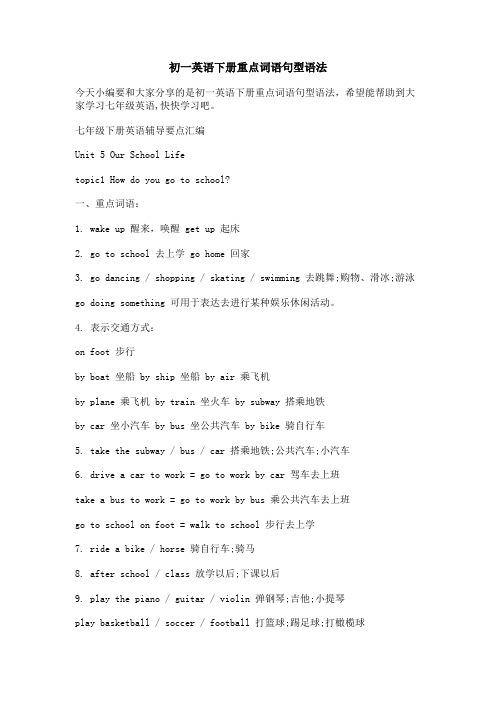
初一英语下册重点词语句型语法今天小编要和大家分享的是初一英语下册重点词语句型语法,希望能帮助到大家学习七年级英语,快快学习吧。
七年级下册英语辅导要点汇编Unit 5 Our School Lifetopic1 How do you go to school?一、重点词语:1. wake up 醒来,唤醒 get up 起床2. go to school 去上学 go home 回家3. go dancing / shopping / skating / swimming 去跳舞;购物、滑冰;游泳go doing something 可用于表达去进行某种娱乐休闲活动。
4. 表示交通方式:on foot 步行by boat 坐船 by ship 坐船 by air 乘飞机by plane 乘飞机 by train 坐火车 by subway 搭乘地铁by car 坐小汽车 by bus 坐公共汽车 by bike 骑自行车5. take the subway / bus / car 搭乘地铁;公共汽车;小汽车6. drive a car to work = go to work by car 驾车去上班take a bus to work = go to work by bus 乘公共汽车去上班go to school on foot = walk to school 步行去上学7. ride a bike / horse 骑自行车;骑马8. after school / class 放学以后;下课以后9. play the piano / guitar / violin 弹钢琴;吉他;小提琴play basketball / soccer / football 打篮球;踢足球;打橄榄球play computer games 玩电脑游戏play with a computer 玩电脑play sports 做运动10. next to 紧挨着,在…旁边11. a plan of my school 一幅我们学校的平面图12. on weekdays 在工作日at weekends 在周末13. have breakfast / lunch / supper / dinner / meals 吃早餐;中餐;晚餐;正餐;一日三餐have classes / lessons / a meeting 上课;上课;开会14. watch TV / movies / games / the animals 看电视;电影;比赛;动物read novels / newspapers / books 看小说;报纸;书15. wash one’s face / clothes 洗脸;衣服16. 反义词:up – down, early – late 近义词:quickly – fastget up early 早起 be late for 迟到17. the first / second / third / fourth day 第一;二;三;四天18. clean the house 打扫房子19. 表示建筑物(尤其学校建筑物):on the playground 在操场at school / home / table 在学校;家里;桌旁in a computer room / tea chers’ office / classroom building / gym / library / lab / canteen在电脑室;教师办公室;教学楼;体操馆;图书馆;实验室;食堂20. around six o’clock = at about six o’clock 大约在六点21. 频率副词:never, seldom, sometimes, often, usually, always二、重点句型:1. It’s time to get up. 该起床的时候了。
九年级英语上册 单词短语+句型+语法全汇总 仁爱版
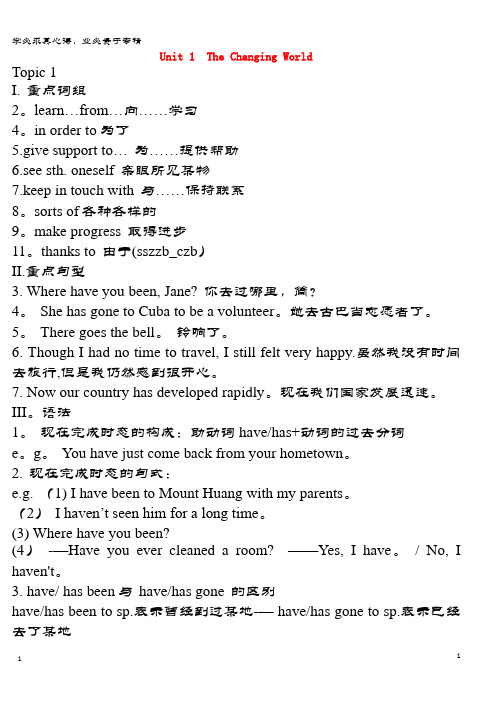
Unit 1 The Changing WorldTopic 1I. 重点词组2。
learn…from…向……学习4。
in order to为了5.give support to… 为……提供帮助6.see sth. oneself 亲眼所见某物7.keep in touch with 与……保持联系8。
sorts of各种各样的9。
make progress 取得进步11。
thanks to 由于(sszzb_czb)II.重点句型3. Where have you been, Jane? 你去过哪里,简?4。
She has gone to Cuba to be a volunteer。
她去古巴当志愿者了。
5。
There goes the bell。
铃响了。
6. Though I had no time to travel, I still felt very happy.虽然我没有时间去旅行,但是我仍然感到很开心。
7. Now our country has developed rapidly。
现在我们国家发展迅速。
III。
语法1。
现在完成时态的构成:助动词have/has+动词的过去分词e。
g。
You have just come back from your hometown。
2. 现在完成时态的句式:e.g. (1) I have been to Mount Huang with my parents。
(2)I haven’t seen him for a long time。
(3) Where have you been?(4)-—Have you ever cleaned a room? ——Yes, I have。
/ No, I haven't。
3. have/ has been与have/has gone 的区别have/has been to sp.表示曾经到过某地-— have/has gone to sp.表示已经去了某地e.g. (1)I have been to Mount Huang with my parents。
八上英语重点单词、短语和句型汇总

⼋上英语重点单词、短语和句型汇总Unit1 Where did you go on vacation?【重点语法】不定代词:不指名代替任何特定名词或形容词的代词叫做不定代词。
⽤法注意:1. some 和any +可数名/不可数名。
some 多⽤于肯定句,any多⽤于否定句、疑问句和条件从句。
有些问句中⽤some,不⽤any, 问话者希望得到对⽅肯定回答。
2. 由some, any, no, every 与 body, one, thing构成的复合不定代词作主语时,其谓语动词⽤三单。
3. 不定代词若有定语修饰,该定语要置于其后:如:something interesting【重点短语】1. buy sth for ab./ buy sb. sth 为某⼈买某物2. taste + adj. 尝起来……3. nothing...but + V.(原形) 除了……之外什么都没有4. seem + (to be) + adj 看起来5. arrive in + ⼤地⽅ / arrive at + ⼩地⽅到达某地6. decide to do sth. 决定做某事7. try doing sth. 尝试做某事 / try to do sth. 尽⼒做某事8. enjoy doing sth. 喜欢做某事9. want to do sth. 想去做某事10. start doing sth. 开始做某事=begin doing sth.11. stop doing sth. 停⽌做某事区分:stop to do sth. 停下来去做某事12. dislike doing sth. 不喜欢做某事14. so + adj + that + 从句如此……以⾄于……16. tell sb. (not) to do sth. 告诉某⼈(不要)做某事17. keep doing sth. 继续做某事18. forget to do sth. 忘记去做某事 / forget doing sth 忘记做过某事【词语辨析】1. take a photo/ take photos 拍照quite a few+名词复数 “许多…”2. seem + 形容词看起来…... You seem happy today.seem + to do sth. 似乎/好像做某事 I seem to have a coldIt seems + 从句似乎..…. It seems that no one believe you.seem like ... 好像,似乎….. It seems like a good idea.3. arrive in +⼤地点= get to= reach+地点名 “到达......”arrive at +⼩地点(注:若后跟地点副词here/there/home, 介词需省略,如:arrive here; get home)4. feel like sth 感觉像…feel doing sth. 想要做某事5. wonder(想知道)+疑问词(who, what, why)引导的从句。
英语重点句型及如何使用

九年级Unit 1—8Unit 1Section 1A1.by介词,“通过…(方式,手段)”by making flashcards 通过做单词抽认卡by doing sth 通过…..方式(途径)。
例:I learn English by listening to tapes.②在…..旁边。
例:by the window/the door③乘坐交通工具例:by bus/car④在……之前,到……为止。
例:by October在10月前⑤被例:English is spoken by many people.2.read the textbook读/看教科书3.make vocabulary lists 列生词表4.listen to tapes听磁带5.ask sb for help向某人求助6.study for a test为备考学习7.watch videos观看录像8.practice sth练习某事;practice doing sth练习做某事Do you ever practice conversations with friends (与朋友对话) I have to practice speaking English everyday.9.read aloud朗读10.that way=in that way 通过那种方式11.improve my speaking skills提高我的会话技巧12. too…to…太….而不能…It’s too hard for me to understand the article. = It’s so hard that I can’t understand the article.13. for example=for instance 例如14. ask about询问有关…;ask sb about sth向某人询问/打听有关…. We asked them about the best ways to learn more English. I want to ask about the use of the new machines.15. watch/see/hear sb do sth观看/看见/听见某人做过某事;watch/see/hear sb doing sth观看/看见/听见某人正在做某事 He can watch actors say the words. Can you hear him singing in the room16. 辨析:sometime ;sometimes ;some times ;some time ①sometime在将来/过去的某一时间 I’ll speak to him about it sometime. 我会找个时间和他谈谈这事. I met her sometime last year.去年的某个时候我见过她. ②sometimes = at times有时,偶尔It is sometimes hot and sometimes cold here. He sometimes writes to me. ③some time A.一些时间:It will take you some timeto walk there. B.在未来的某时=sometime: Phone me some time next week下个星期什么时候给我打电话吧. ④some times一些次,几次 I've told him the thing sometimes.17. join短语:①join sb加入到某人的活动中去②join in+活动项目"参加…活动" I'd like to join in the game. ③join+组织机构"加入到某个组织机构,成为其中的一个成员"join the Party; join the League, The best way to improve your English is to join an English club18. have fun 玩得高兴19. not at all 一点也不20. get excited 高兴、激动21. end up (vi.) 结束; 告终; 结果 ; 最后end up doing sth.We end up taking a taxi there .我们结果乘出租车去了那里. We sometimes end up speaking in Chinese.(以说汉语结束对话)22. do a survey 做调查;do a survey about针对…做调查 I'm doing a survey about learning English. 我在进行学习英语的调查。
初一英语语法知识点总结复习(超详细)

课时一重点语法1.动词be(am,is,are)的用法:be动词包括―am‖, ―is‖, ―are‖三种形式。
①第一人称单数(I)配合am来用。
句型解析析:I am+…②第二人称(You)配合are使用。
句型解析:You are+…③第三人称单数(He or She or It)配合is使用。
句型解析:She(He, It) is +……④人称复数(we /you/they)配合are使用。
句型解析:We (You, They) are +……例句We are in Class 5,Grade 7.They are my friends.You are good students.用法口诀:我(I)用am, 你(you)用are,is跟着他(he),她(she),它(it)。
单数名词用is,复数名词全用are。
变否定,更容易,be后not加上去。
变疑问,往前提,句末问号莫丢弃。
还有一条须注意,句首大写莫忘记。
一. 用括号中适当的词填空。
1. I ________(am, are, is) from Australia.2. She _______ (am, are, is) a student.3. Jane and Tom _________(am, is, are) my friends.4. My parents _______ (am, is, are) very busy every day.5. _______ (Are, Is, Do, Does) there a Chinese school in New York?6. _______ (Be, Are, Were, Was) they excited when he heard the news?7. There _____ (be) some glasses on it.8. If he _____ (be) free tomorrow, he will go with us.一、用be 动词的适当形式填空1. I ______ a boy. ______ you a boy? No, I _____ not.2. The girl______ Jack's sister.3. The dog _______ tall and fat.4. The man with big eyes _______ a teacher.5. ______ your brother in the classroom?6. Where _____ your mother? She ______ at home.7. How _______ your father?8. Mike and Liu Tao ______ at school.9. Whose dress ______ this?10. Whose socks ______ they?11. That ______ my red skirt.12. Who ______ I?13.The jeans ______ on the desk.14.Here ______ a scarf for you.15. Here ______ some sweaters for you.16. The black gloves ______ for Su Yang.17. This pair of gloves ______ for Yang Ling.18. The two cups of milk _____ for me.19. Some tea ______ in the glass.20. Gao shan's shirt _______ over there.第二课时(1)英语人称代词和物主代词一、人称代词表示―我‖、―你‖、―他‖、―她‖、―它‖、―我们‖、―你们‖、―他们‖的词,叫做人称代词。
